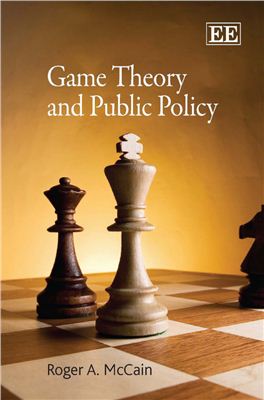Edward Elgar Pub, 2009. - 262 pages.
Game theory is useful in understanding collective human activity as the outcome of interactive decisions. In recent years it has become a more prominent aspect of research and applications in public policy disciplines such as economics, philosophy, management and political science, and in work within public policy itself. Here Roger McCain makes use of the analytical tools of game theory with the pragmatic purpose of identifying problems and exploring potential solutions in public policy.
In practice, the influence of game theory on public policy and related disciplines has been less a consequence of broad theorems than of insightful examples. Accordingly, the author offers a critical review of major topics from both cooperative and noncooperative game theory, including less-known ideas in noncooperative game theory and constructive proposals for new approaches. In so doing, he provides a toolkit for the analysis of public policy as well as a clearer understanding of the public policy enterprise itself.
The author's unique approach and treatment of game theory will be a useful resource for students and scholars of economics and public policy, as well as for policymakers themselves.
Game theory is useful in understanding collective human activity as the outcome of interactive decisions. In recent years it has become a more prominent aspect of research and applications in public policy disciplines such as economics, philosophy, management and political science, and in work within public policy itself. Here Roger McCain makes use of the analytical tools of game theory with the pragmatic purpose of identifying problems and exploring potential solutions in public policy.
In practice, the influence of game theory on public policy and related disciplines has been less a consequence of broad theorems than of insightful examples. Accordingly, the author offers a critical review of major topics from both cooperative and noncooperative game theory, including less-known ideas in noncooperative game theory and constructive proposals for new approaches. In so doing, he provides a toolkit for the analysis of public policy as well as a clearer understanding of the public policy enterprise itself.
The author's unique approach and treatment of game theory will be a useful resource for students and scholars of economics and public policy, as well as for policymakers themselves.

